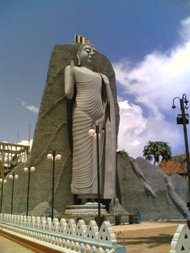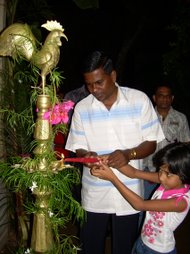Is the end near for Sri Lanka's rebels?- BBC
| By Alastair Lawson BBC News |
The Sri Lankan army's capture of Elephant Pass, the strategic causeway linking the Jaffna peninsula with the mainland, is arguably one of the military's greatest successes over the past two decades of war.
It follows last week's fall of the town of Kilinochchi - the rebel's political and administrative centre - providing the government with two significant military and strategic breakthroughs within a fortnight.
It can also bask in the propaganda value of the army's latest advance. Elephant Pass has already been described by those close to the government as "symbolic of the unity that exists between the north and the south of our country".
The army can now re-supply its troops in the north by land instead of carrying out expensive and sometimes dangerous air and sea operations to avoid rebel territory.
Ruthless
On the face of it, President Mahindra Rajapaksa has fulfilled his election promise to defeat the Tamil Tigers and end their military campaign for a separate homeland in the north and east of the country for good.
| The rebels have proved over the years they are an effective guerrilla group |
But dig a little deeper and the matters become much more complicated.
Although the Tamil Tigers are unquestionably on the back foot, it would be dangerous to discount them as a spent force. They have proved time and time again over the past 20 years that they are a disciplined, organised and at times ruthless guerrilla outfit.
"The rebels began their separatist campaign in the late 1970s as a separatist guerrilla group so defeat on the battleground means that in many respects they are returning to their roots," says Saroj Pathirana of the BBC Sinhala service.
"But that still does not mask the fact that the Tamil Tigers have probably come to their lowest point since the war began, and given recent military advances it must now only be a question of time before their last remaining stronghold - the eastern town of Mullaitivu - also falls."
Most analysts agree that Mullaitivu may prove a harder nut to crack because the town and the area immediately surrounding it are long thought to have been the centre of the rebels' military power.
It is estimated that the rebels have between 1,500 to 3,000 armed personnel still prepared to fight and that there are around 300,000 civilians in the Mullativu area.
But assuming it does fall - and few doubt that it will - what then will be the next step of the Tamil Tiger leader, Velupillai Prabhakaran, who has run his organisation over the years with a vice-like grip?
Guerrilla war
Some argue that he may choose to flee to India. But that would have to be under cover because he is wanted by the Indian authorities for his role in the murder of former Prime Minister Rajiv Gandhi while election campaigning in 1991.
| Saroj Pathirana, BBC Sinhala service |
Another option would be for him to remain hiding in the thick jungle of northern Sri Lanka - but that too would be risky as the Sri Lankan military presence grows stronger in the area.
A third possibility is the rebel leader re-starting a guerrilla war in the south as well as the north. Whatever option he chooses, it is unlikely that Mr Prabhakaran - who advises his cadres to swallow cyanide capsules if they are captured - will be taken alive.
Even if Mr Prabhakaran is taken out of the equation, demands for a separate Tamil state are unlikely to go with him. Over the years the Tamil diaspora in the US, Europe and Asia has provided large amounts of cash for the cause - and that money supply cannot be expected to dry up over night.
While President Rajapaksa celebrates it is not clear whether all his countrymen are equally elated. When news of Elephant Pass falling was announced in Colombo on Friday, there was mixed public reaction in contrast to the fire crackers and dancing on the streets that greeted the capture of Kilinochchi.
Ransacked
Interspersed between the military gains were two events that upset many Sri Lankans, especially those who support the opposition United National Party.
On Thursday, the editor of the Sunday Leader newspaper, Lasantha Wickramatunga, was shot dead in Colombo.
| Sri Lankan troops are close to capturing all rebel territory |
Mr Wickramatunga was one of the country's most well-known journalists - a prominent critic of the government and sympathetic towards the opposition.
Human rights groups said that his death was a hammer blow for press freedom in the country, with some even arguing that the president himself must bear some responsibility because he and his associates "incited hatred" against the editor and "allowed an outrageous level of impunity to develop as regards violence against the media".
And just days before Mr Wickramatunga's murder, gunmen armed with grenades ransacked offices of the largest private TV broadcaster in the country.
"All this has created a climate of fear in Sri Lanka which many people feel has darkened the success of the military in the battlefield. Some people feel that anyone who questions the government's actions are automatically rebel-sympathisers and enemies of the state," says Saroj Pathirana.
While President Rajapaksa has arguably made more progress than any of his predecessors to end Sri Lanka's war, his military and political battles are far from over.




